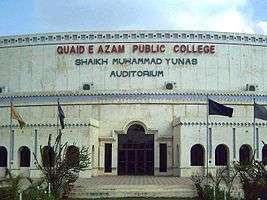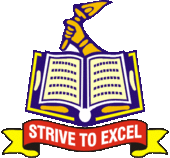Quaid-E-Azam Divisional Public School and College
| Quaid-E-Azam Public College Gujranwala | |
|---|---|
|
Strive To Excel | |
| Location | |
|
G.T.Road, Gujranwala, Punjab Pakistan | |
| Information | |
| Type | Public college |
| Established | 1987 |
| Founder | A Z K Sherdil |
| Chairman | Commissioner Gujranwala Division |
| Principal | Mr. Sajid Jamal Khan |
| Number of students | 4100 (approx.) |
| Area | 65 acres (0.26 km2) |
| Affiliation |
GBISE GCSE |
| Website |
www |
Quaid-E-Azam Divisional Public School and College is an educational institution for boys and girls of the Gujranwala division of the Pujab in Pakistan. It is located on G.T.road 1 km from Aziz cross (pindi bypass) inside Gujranwala, Punjab, Pakistan. It is a semi governmental institution. It is a public college with mainly two streams GCSE and GBISE up to O-Level, secondary and higher secondary levels.[1][2][3][4][5]
Introduction

Commissioner Gujranwala Division is the Chairman and Mr. Sajid Jamal Khan is the present Principal of the college. It provides education from nursery to higher secondary level and O-Levels. It has four sections
- Junior School
- Girls College
- Boys School
- Boys College
The total strength of the institute is 4100 students. It spreads over 65 acres land area. The staff strength is 362 in total, among them the teaching staff is 175.[6]
| Chairman | Mr. Shamail Ahmed Khawaja (Commissioner Gujranwala Division) |
| Principal | Mr. Sajid Jamal Khan |
| Address | G.T.Road Gujranwala Punjab Pakistan |
| Total Area | 65 Acres |
| Total Students | 4100 |
| Total Staff(Teachers+Admin) | 362 |
| Total Teachers | 175 |
History
Quaid-e-Azam Divisional Public School & College, Gujranwala was established on August 13, 1987 under the patronage of Quaid-e-Azam Divisional Educational Trust.
The institution was started initially in a rented place. However, later on the college constructed its own campus. The land of 65 acres for this campus was donated by the Punjab Government of that time, but the development and infrastructure was built and maintained by donations, contributions, fund raising and tuition fees. Finally the college shifted to its present location on September 7, 1988.
The separate Section of Boys School and College was started in April 1993. The up-gradation of school to the college level for boys and girls was accomplished in 1994. In 1997 ’O’ Level classes for boys and girls were introduced.
The Sheikh Mohammad Younas auditorium was constructed in 1994. Jamia Masjid in the College was constructed in 1997.
A new double story block of Boys College has been constructed and in operation since December 8, 2012.
Governing bodies
There are two governing bodies of the QPC:-
- Board of Trustees
- Board of Governors
The Chairman of the Board of Governors is the Commissioner of Gujranwala Division, while the DCO is the Vice Chairman of the board. In addition to a few Govt. Officials there are fixed seat for dignitaries who are the noble citizens of Gujranwala. Principal is the member as well as the secretary of the Board.
Organization and curriculum
Academic organization
QPC comprises four sections:
- Junior School (Class 1 to 5)
- Girls College (Class 6-12, including O’ Levels and Intermediate)
- Boys School (Class 6-8)
- Boys College (Class 9-12, including O' Levels and Intermediate)
Each school has a separate geographical location and a separate Head. Junior School and Girls College are headed by the Headmistresses while Boys School and Boys College are by the Headmasters. All the four Heads report directly to the Principal who is the overall in charge of the estate, academics and administration.
Curriculum
The Boys and Girls College offers preparation for General Certificate of Secondary Education (GCSE) from University of Cambridge International Examinations (CIE), following the British Cambridge Assessment (UCLES) system. The Cambridge Classes C1 through C3 are prepared for International GCSE Ordinary Level or O Level (equivalent to national Secondary School Certificate or SSC).
The national 'Matriculation' curriculum is also available to students of grades 9 and 10 who do not wish to pursue the international board examinations. Grades 11 and 12 are prepared for Higher Secondary School Certificate (HSSC) examinations from the Board of Intermediate and Secondary Education (GBISE) Gujranwala.
References
- ↑ "Admission Quaid-e-Azam Divisional Public School and College Gujranwala - Nawaiwaqt - 23-March-2012". Dailypaperpk.com. 2012-03-23. Retrieved 2014-06-16.
- ↑ "Quaid E Azam Public College - Gujranwala". Entrytest.com. Retrieved 2014-06-16.
- ↑ "Quaid-E-Azam Divisional Public School And College | Gujranwala | Pakistan | Schools | JantaReview Mobile". Pk.jantareview.com. Retrieved 2014-06-16.
- ↑ "BOARD OF INTERMEDIATE & SECONDARY EDUCATION, GUJRANWALA : SECONDARY SCHOOL CERTIFICATE PART-II (ANNUAL) EXAMINATION, 2012" (PDF). Bisegrw.com. Retrieved 9 December 2014.
- ↑ "Distinguished alumni of FA/FSc exams - Newspaper". Dawn.Com. 2013-09-23. Retrieved 2014-06-16.
- ↑ "Quaid-e-Azam Public College Gujranwala". qpc.edu.pk. Retrieved 2014-03-02.
Coordinates: 32°11′17″N 74°10′59″E / 32.188°N 74.183°E
